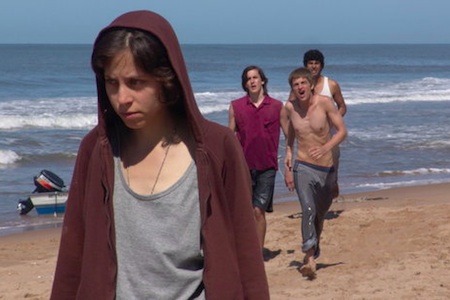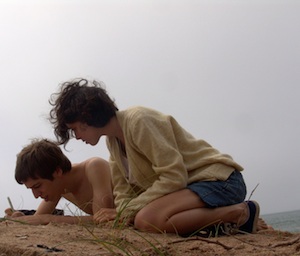A father sits at the bedside of his child and, when asked what he is doing, softly answers, “I’m looking after you.” Words and tone and eyes convey anxiety, fatigue, and overwhelming tenderness. And this complicated admixture telegraphs to the viewer and the child on-screen, in the aftermath of trauma and terrifying distress, a heart-calming constant: that, as he tells another character, from the moment of her birth, he has always seen her as perfect.
This flawless child, Alex (Inés Efron), the emotional focal point of 2007’s XXY, written and directed by Argentina’s Lucía Puenzo, is also a moody, unpredictable 15-year-old, and her own complicated admixture is spiked by casual cruelty and a tendency to press at the boundaries of those in her orbit, even while holding the world at bay to protect a secret. She’s also captivating, forcefully intelligent, and unreservedly herself, even in the process of feeling her way toward an understanding of what, exactly, that self is.
Decisions made before Alex’s birth have, in a sense, led to this sweet and sorrowful exchange between father and daughter. She was born intersex, with both male and female sexual characteristics, and raised female (based, it seems, on her parents’ informed best guesses, though this is never explicitly stated). Kraken (Ricardo Darín), a marine biologist, and Suli (Valeria Bertuccelli) decided to forgo a so-called normalizing surgery for Alex: in essence, a dubious attempt to impose a firm gender identity at birth. Without ever fully conquering their own unease and fears for a beloved child, they have left her in possession of the facts and the right to make her own choices—an emotional, improvised, and at times visceral process.
The task, grown more difficult with adolescence, takes on a painful new weight when Erika (Carolina Peleritti), an old friend of Suli’s from Buenos Aires; her husband, Ramiro (Germán Palacios); and their teenage son, Alvaro (Martín Piroyansky), come to visit the family’s home on the southern coast of Uruguay, where they moved shortly after Alex’s birth. This other family of three, with their own fraught relationship between father and child, carry with them the social preconceptions and imperatives that Alex’s parents have sought to shield her from by living in an isolated place. They can’t, of course, shield her, and Alex is changing already, with or without the interference of strangers, but their arrival invests her process of discoveries with a sense of urgency or even necessity, and perhaps possibility. In part the catalyst is Ramiro, a renowned plastic surgeon who has come intending to recommend and advise them on “corrective” surgery. But the attraction that forms between his son and Alex exerts its own force on both of them, and for Alex such a connection inevitably involves the desire to reveal herself and the risk of betrayal that, she has reason to know, attends such exposure.
Puenzo’s first full-length film, XXY is beautifully shot by cinematographer Natasha Braier and, save for a few false notes, well scripted—its silences and ambiguities and transfixing images engaging our imagination and sympathy. A good deal of credit for its successes (it won numerous international awards, including honors at Cannes and Spain’s Goya Awards) also falls to Efron’s portrayal of Alex, whom we come to view with the same potent compound of emotions as those who watch over her in the film.
Perhaps Puenzo was equally moved, as she went on to cast Efron in her next project, 2009’s The Fish Child, another film involving a charged relationship between father and daughter and a flight out of Buenos Aires toward hoped-for sanctuary—here for two young women in love. Lined up sideways, and set next to two other recent films by Argentinian directors, these stories start to make the city—and the state—look like a place that you leave, or live in uneasily. The quirkily phobic shut-ins of Gustavo Taretto’s Sidewalls (2011)—in which, coincidentally, Efron also appears—scan the urban geography of Buenos Aires and find it worryingly antihumanist, while Alexis Dos Santos leaves Argentina behind completely for 2009’s Unmade Beds, a lyrically meandering story of young expats navigating life in and around a London squat. But while a sweetly melancholy tone pervades each of those films, all signs of levity are absent from Puenzo’s second feature, which makes XXY’s solicitous father seem like a wistful dream. “I’m looking after you,” he says. But for The Fish Child’s pair of troubled daughters, safety and happiness lie elsewhere, submerged and out of sight.





